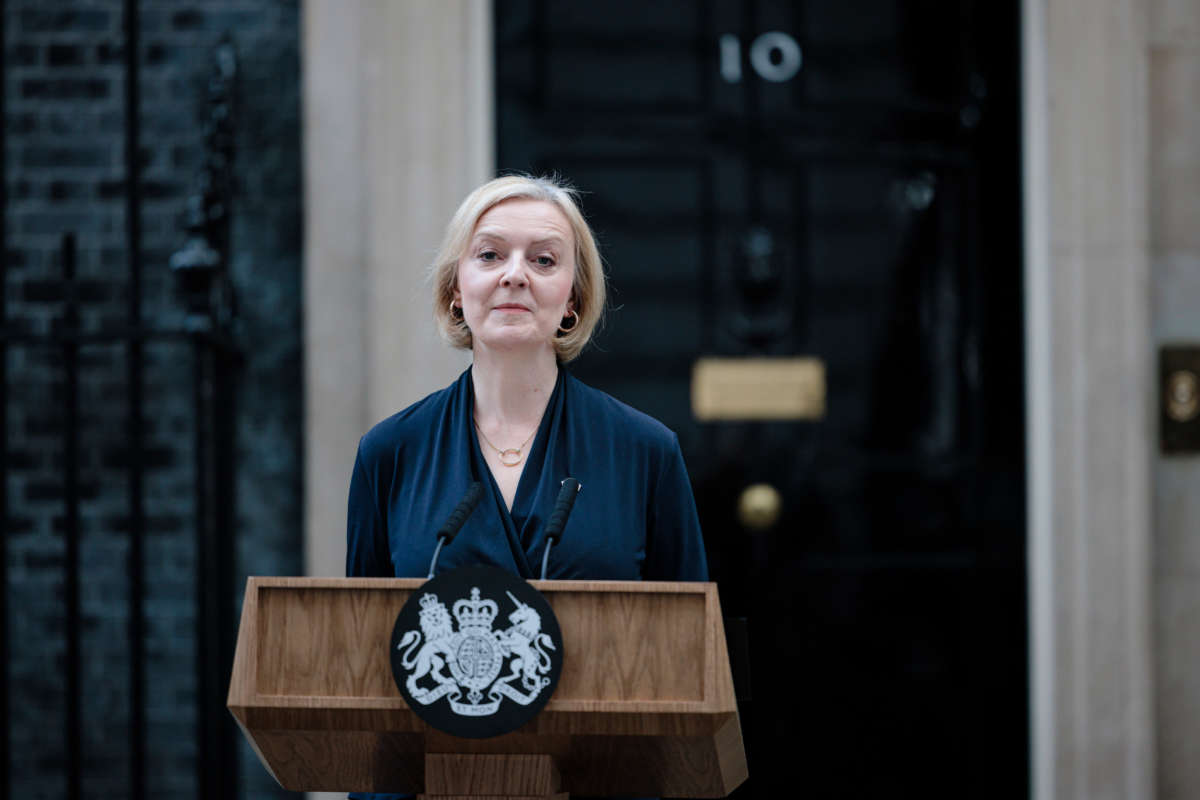Did you know that Truthout is a nonprofit and independently funded by readers like you? If you value what we do, please support our work with a donation.
Just before 1:30 pm London Time on Thursday, Downing Street announced that Prime Minister Liz Truss would be making a brief statement. A few minutes later, the frazzled leader — whose authority was shredded by the firing of her chancellor and the resignation of her home secretary, by open revolt among her Members of Parliament (MPs), and by a market swan dive in response to her signature policies — announced that she was quitting.
The Conservatives are now improvising as they go, desperate to avoid triggering a general election that polls suggest would spell the political death of the party. The party is trailing Labour by over 30 percent; 87 percent of the public disapprove of Conservatives’ handling of the economy, and in the days before her resignation, only 9 or 10 percent of the electorate had a favorable view of Truss. By every measure, Truss was the most unpopular U.K. prime minister in the history of polling.
Within minutes of Truss’s resignation, the party had announced it would hold a snap leadership contest, with the aim of installing a new prime minister at the helm by October 28. The hope in doing a quick-and-dirty transition, was, presumably, that it would forestall a long fratricidal turf war, denying extremists in the party the chance to build support amongst the party’s base — the same base that had, over the opposition of the parliamentary party, elevated Truss to power in the first place.
Yet, any hope the party had of making this a smooth transition — of finding a single leader who would unite the Conservatives and forestall a messy contest — was dashed two hours later when disgraced ex-Prime Minister Boris Johnson — who had been sitting out the Truss fiasco by holidaying in the Caribbean — let it be known to select journalists that he would likely be standing in the contest as a matter of “national interest.”
And so, now the British post-Brexit soap opera continues.
Truss’s demise is a case study in what happens when a political system built around notions of stability and continuity breaks down.Truth
The day before Truss quit — making her prime ministerial tenure the shortest in British history, and disqualifying her for the generous lifelong pension that all ex-prime ministers get so long as they have served a minimum of two months in office — she had addressed a hostile House of Parliament and emphatically declared that she was “not a quitter,” and that she would lead her party into the next general election.
But behind the scenes, the wheels of a palace coup were already in motion. The six weeks of chaos following Truss’s installment as prime minister were, apparently, too much even for the pliant Conservative backbenchers.
A recap:
Last week, Truss fired Chancellor Kwasi Kwarteng for pushing a “mini-budget” chock-full of Truss’s own rigidly ideological policy stances — policies that tanked the British bond market, sent mortgage rates hurtling upward, threatened to swamp the British pension system by undermining private funds’ investments and forced a huge Bank of England intervention.
In firing Kwarteng for implementing her vision, Truss simply alienated much of her own parliamentary party. When her far right home secretary resigned — ostensibly for using her private email account to communicate about official matters, but, rumor has it, really because she expressed reservations about Truss’s plans to relax immigration restrictions so as to bring in more workers to fill jobs left empty by the exodus of European Union workers in the wake of Brexit — any semblance of party unity disintegrated. When the Truss team then attempted, yesterday evening, to make a parliamentary vote on fracking a vote of confidence, their own party whip and deputy whip refused to vote with the government and resigned (though the confusion was such that ministers couldn’t confirm or deny the resignations had occurred), and opposition MPs gleefully took cellphone videos of ministers attempting to manhandle MPs into the voting lobby to vote the government’s way.
There is, at this point, more than an element of farce to British politics. The Conservative Party, which for hundreds of years has been widely viewed as the gold standard of “stability” in not just British but European politics, has now run through four prime ministers since Brexit, and by next week will have its third leader in as many months.
On October 11, The Economist wrote that Truss had burned through her political credibility in one week, the “shelf life of a lettuce,” as they dryly put it. Since then, the tabloid newspaper the Daily Star has run with the analogy, publishing a picture of said lettuce every day on its front page, along with a framed photo of Truss. Its day one headline, the first of a week’s worth of brutal captions, asked, “Which wet lettuce will last longer?” Today, The New York Times answered the question: “The Lettuce Outlasts Liz Truss.”
Now, as a snap leadership election looms, the question is whether Boris Johnson will manage to rise, like a phoenix from the ashes of the Truss disaster, to resurrect his own career. His claims to be riding to the national rescue are, of course, entirely bogus; but, so desperate are the Conservative grassroots for any semblance of charisma and competence that it’s entirely possible that they will turn, once more to “Boris.” If they do, it’s hard to see how the Conservative Party avoids fissuring beyond repair.
Media that fights fascism
Truthout is funded almost entirely by readers — that’s why we can speak truth to power and cut against the mainstream narrative. But independent journalists at Truthout face mounting political repression under Trump.
We rely on your support to survive McCarthyist censorship. Please make a tax-deductible one-time or monthly donation.
